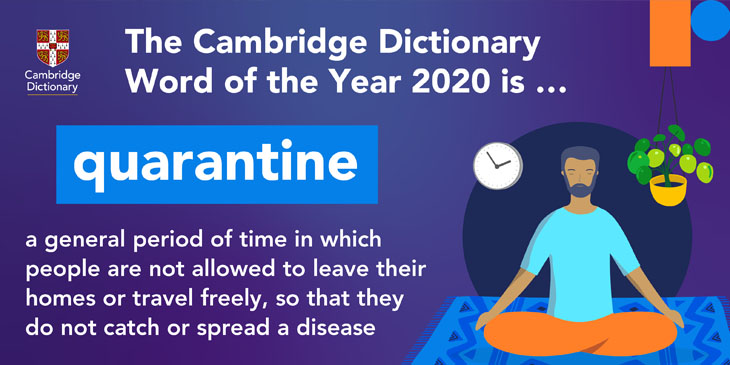24 November 2020

Cambridge Dictionary has announced ‘quarantine’ as Word of the Year 2020, after data shows it was one of the most highly searched words on the Cambridge Dictionary this year.
Quarantine was the only word to rank in the top five for both search spikes and overall views (more than 183,000 by early November), with the largest spike in searches (28,545) seen the week of 18-24 March, when many countries around the world went into lockdown as a result of COVID-19.
The Cambridge Dictionary editors have also tracked how people are using quarantine, and have discovered a new meaning emerging: a general period of time in which people are not allowed to leave their homes or travel freely, so that they do not catch or spread a disease. Research shows the word is being used synonymously with lockdown, particularly in the United States, to refer to a situation in which people stay home to avoid catching the disease.
This new sense of quarantine has now been added to the Cambridge Dictionary, and marks a shift from the existing meanings that relate to containing a person or animal suspected of being contagious: a specific period of time in which a person or animal that has a disease, or may have one, must stay or be kept away from others in order to prevent the spread of the disease.
Wendalyn Nichols, Cambridge Dictionary Publishing Manager, said: ‘The words that people search for reveal not just what is happening in the world, but what matters most to them in relation to those events.
‘Neither coronavirus nor COVID-19 appeared among the words that Cambridge Dictionary users searched for most this year. We believe this indicates that people have been fairly confident about what the virus is. Instead, users have been searching for words related to the social and economic impacts of the pandemic, as evidenced not just by quarantine but by the two runners-up on the shortlist for Word of the Year: lockdown, and pandemic itself.’
Cambridge Dictionary is the top dictionary website for learners of English in the world. As well as definitions, the Cambridge Dictionary shows how words are used in real-world contexts. Its ‘About Words’ blog, written by language usage experts, helps learners gain confidence in using vocabulary related to specific topics. The most highly viewed blog post this year was Quarantine, carriers and face masks: the language of the coronavirus, which had almost 80,000 views in the first six weeks after it was posted on February 26, and now ranks as the ninth most viewed About Words post in the nearly ten years that the blog has been live. The post covers a range of related terms, such as infectious, contagious, carriers, super-spreaders, and symptoms, as well as phrases such as contract a virus, a spike in cases, contain the spread, and develop a vaccine.
The Cambridge Dictionary editors regularly monitor a wide range of sources for the new words and meanings that are added monthly to the online dictionary. On the ‘New Words’ blog, potential new additions are posted weekly for readers to cast their vote on whether they feel these words should be added. In a recent poll, 33 percent of respondents said quaranteam - combining quarantine and team, meaning a group of people who go into quarantine together - should be added to the dictionary. Other suggestions include the portmanteau words quaranteen, coronnial and lockstalgia.